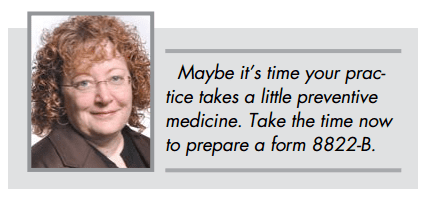Changes in Responsible Parties – Internal Revenue Service Issues New Reporting Rules
If your medical practice is like many others in the area, its identity and composition is likely different today than when it first began.
This could be the result of a number of factors, including the retiring of founding physicians, the transition of leadership to other physician-owners in the practice, or the onboarding and eventual promotion of new physicians to leadership roles, to name a few. It might also include a change of location or a name change.
If this applies to your practice, there is a new set of rules issued by the IRS that may impact that way you report these changes.
Under Treasury regulations effective Jan. 1, 2014, entities with an employer identification number (EIN) must report a change in the identity of the ‘responsible party’ (defined below) within 60 days.
Entities assigned an EIN include employers, corporations, partnerships, exempt organizations, estates, trusts, and others. When an entity requests an EIN, the name and Social Security number (SSN) of the responsible party must be provided.
As defined in the instructions, for entities that are not publicly traded or registered with the SEC, the responsible party is “the person who has a level of control over, or entitlement to, the funds or assets in the entity that enables the individual, directly or indirectly, to control, manage, or direct the entity and the disposition of its funds and assets.” Earlier versions of the application for EIN did not include the term ‘responsible party.’ Instead, it asked for the name and SSN of the following individuals:
• The principal officer if the business is a corporation;
• A general partner if a partnership;
• The owner of an entity that is disregarded as separate from its owner (disregarded entities owned by a corporation enter the corporation’s name and EIN); or
• A grantor, owner, or trustor if a trust (from the 2009 revision). This list from earlier versions of the application is now the definition of ‘responsible party’ that applies to entities that are publicly traded or registered with the SEC.
In response to comments submitted by tax practitioners to the Treasury, the IRS stated that, while the new rules have an impact on a substantial number of small entities, the burden is minimal, and the costs and burdens are outweighed by the benefits to tax administration.

You will need to file Form 8822-B to report changes in the identity of the responsible party. If a change was made prior to Jan. 1, 2014 and not reported to IRS, the instructions indicate that the form should have been filed by March 1, 2014.
Note that Form 8822-B is also used to report a change in business address. The IRS will have a record of the taxpayer’s last known address from the most recent tax return that was filed. The taxpayer can indicate a change in address by checking a box at the top of the return. Form 8822-B should be used if there has been a change since the last return was filed.
Also, some trusts do not file an annual return. For example, a trust may be created to own life-insurance policies. Such a trust may have applied for an EIN when formed, but may not file an income-tax return for many years — until the life-insurance policy is redeemed. The trust may use Form 8822-B to notify IRS of an address change.
A change in an individual’s home address may be reported on Form 8822. A change in name must be documented with the Social Security Administration prior to using the name on the individual income-tax return.
There are no penalties for failure to file Form 8822-B or 8822. However, failure to update information with the IRS may result in an undelivered notice of audit. Failure to respond in a timely manner will lead to an undelivered notice of deficiency. The taxpayer may miss certain deadlines for appeal, and interest and penalties will accrue.
Maybe it’s time your practice takes a little preventive medicine. Take the time now to prepare a form 8822-B; it’s in the practice’s best interest to ensure that the IRS knows who to contact and where to contact them to resolve tax matters. v
Terri Judycki, CPA, MST, is senior tax manager with the certified public accounting firm Meyers Brothers Kalicka, P.C. in Holyoke; (413) 536-8510.




Comments are closed.